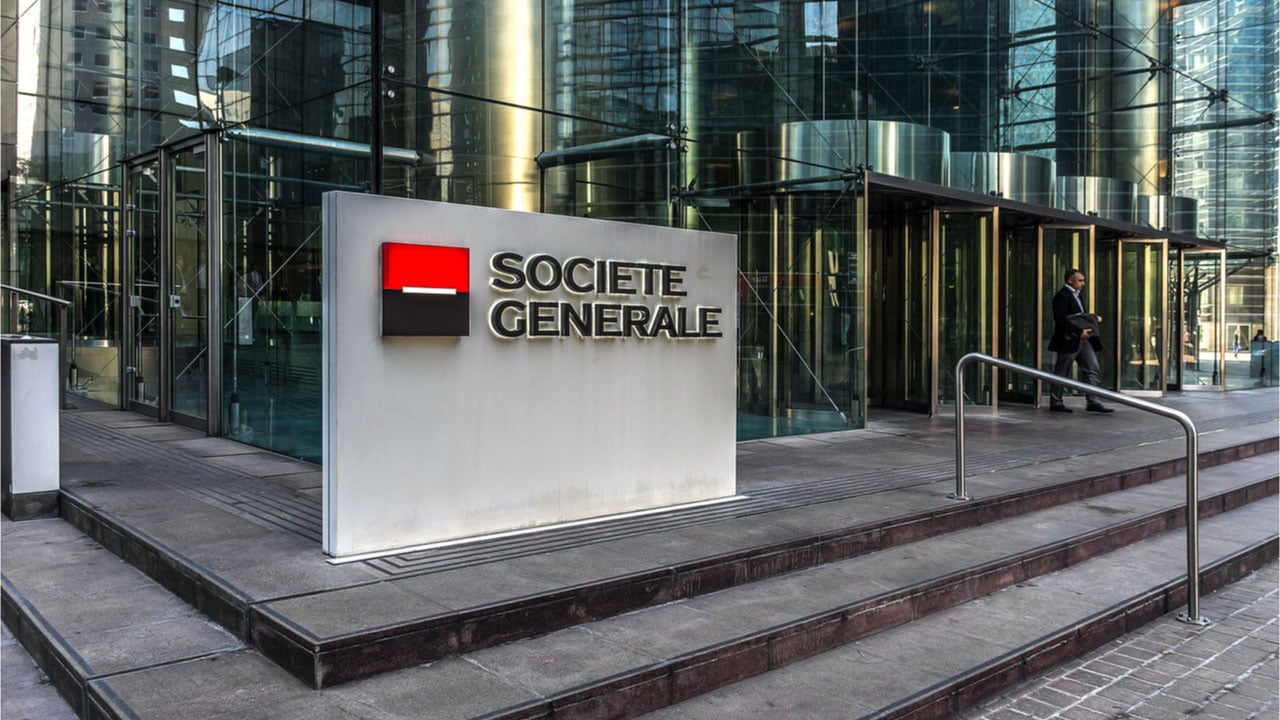 French multinational investment bank and financial services company, Societe Generale, has proposed to leverage the decentralized finance (defi) protocol Makerdao. The proposal dubbed “Security Tokens Refinancing” was published on October 1 to Makerdao’s forums and the submission aims to utilize the DAI stablecoin to refinance a covered bond concept. Societe Generale Proposes Leveraging Makerdao and […]
French multinational investment bank and financial services company, Societe Generale, has proposed to leverage the decentralized finance (defi) protocol Makerdao. The proposal dubbed “Security Tokens Refinancing” was published on October 1 to Makerdao’s forums and the submission aims to utilize the DAI stablecoin to refinance a covered bond concept. Societe Generale Proposes Leveraging Makerdao and […]
The digital assets division of the international bank wants to provide home loan-backed security tokens as collateral for the loan.
One of France’s leading banks has turned to decentralized finance pioneer MakerDAO to propose the submission of bond tokens as collateral for a loan of the DAI stablecoin.
The historic proposal called “Security Tokens Refinancing” was submitted to Maker’s governance forums by the international bank on Oct. 1. It would be the first major collaboration between a traditional bank and a DeFi protocol and could open the door for closer integration between the two sectors.
Societe Generale (SG) labeled it as the “first experiment at the crossroads between regulated and open source initiatives.”
The bank has proposed that it provides “OFH” security tokens (obligations de financement de l’habitat) which are characterized as covered bonds under French law, and backed by home loans.
These would be used to collateralize a $20 million loan in Maker’s DAI stablecoin which would be mediated by a number of legal entities and mature in six to nine months.
The Ethereum-based security tokens were issued in May 2020 with a nominal amount of 40 million Euro ($46.3M) and a fixed rate of 0%. They mature in May 2025 and have the top credit rating of AAA by rating agencies Moody’s and Fitch.
MakerDAO founder Rune Christensen said he had “no clue” about this proposal, adding that “this is one of multiple recent examples in Maker Governance of how the post-foundation model of organization is proving to be more scalable.”
Société Générale, the third largest bank in France, just made a collateral onboarding application to Maker for 20 million USD.
— Rune Christensen (@RuneKek) September 30, 2021
Backed by EUR bonds, proposed by their blockchain subsidiary.https://t.co/hxGEMOIWjy
Industry observer “DCInvestor” commented on the potential impact of deals such as this on Ethereum and its position as a global settlement layer:
“Societe Generale with their attempt to get their on-chain assets usable in Maker and you're wondering if Ethereum will become a global settlement layer it's happening, now.”
SG stated that the loan would be a “pilot use case,” with the goal of helping to “shape and promote an experiment under the French legal framework,” and “enhance a profitable service and foster liquidity for digital bonds.”
SG Forge, a regulated subsidiary of the bank that deals with crypto assets, is managing the proposal which is based on the open-source framework CAST (Compliant Architecture for Security Tokens).
The legal framework for the deal is complex as it needs to integrate an institutional financial organization with a decentralized governance-based network. A flowchart provided by the bank details six separate entities involved in the process. These include the registrar Societe Generale Forge, the bank itself SG, MakerDAO, a legal representative for the DeFi protocol, security agent DIIS Group, and a third-party exchange agent.
Related: Senator Warren’s office confuses MakerDAO for failed 2016 project The DAO
Pseudonymous MakerDAO community member ‘PaperImperium’ commented on the proposal in the forum:
“Maker and SocGen-Forge are standing at the precipice of financial history. What a time to be alive.”
The proposal is currently being discussed and will move to a formal governance vote in the weeks to come.
It is not the first time Societe Generale has dabbled with Ethereum-based security tokens. In April 2019, the bank’s SG Forge unit issued a 100 million Euro bond as an OFH security token on Ethereum.

Despite being up 400,000% since June 2011, Bitcoin’s place in investment portfolios is still up for debate according to some investment banking analysts.
Bitcoin’s price volatility is once again the subject of criticism from bankers as analysts from Société Générale take aim at the premier cryptocurrency.
In an investor note quoted by CNBC, analysts at the bank argued that Bitcoin’s (BTC) “erratic price movements” devalued its place in investment portfolios.
According to the investor note, the looming threat of government crackdowns across the globe puts significant downside pressure on future Bitcoin price action.
Indeed, the recent BTC price plunge has also coincided with several negative regulatory moves from government agencies across the world. As previously reported by Cointelegraph, the United States Treasury is looking to mandate reporting of crypto transactions above $10,000 to the Internal Revenue Service.
The Société Générale analysts also touched on the Bitcoin and gold comparisons, agreeing that investors see both assets as hedges against monetary debasement. However, beyond partial protection, the analysts identified positive price movements and fear-of-missing-out buying as the only claim to fame to both store of value assets, stating:
“The only potential reward to investors in Bitcoin and gold is from their positive price movement, which is essentially the only thing they have in common, apart from their ability to trigger rush buying.”
Despite the recent price troubles for Bitcoin, BTC is up 38% year-to-date and 312% in the last year. While some bankers may identify volatility as a bug, proponents like Mark Yusko, CEO of Morgan Creek Capital Management, see volatility as a feature of Bitcoin’s long-term value potential.
Speaking to CNBC on Thursday, Yusko argued that volatility was a necessary part of Bitcoin’s 223% per annum positive compounding capability over the last decade.
"#Bitcoin has the same amount of volatility as Amazon stock...when was the right time to sell Amazon? That would be never. Volatility is not your enemy." @MarkYusko on $BTC and crypto volatility: pic.twitter.com/QLWcoR7DzA
— Worldwide Exchange (@CNBCWEX) May 20, 2021
“Bitcoin has the same amount of volatility as Amazon stock […] When was the right time to sell Amazon? That would be never. Volatility is not your enemy.”
Meanwhile, Singapore’s crypto-friendly banking giant DBS has released a report calling Bitcoin “an opportunity that fiat money cannot buy.”
 The European Investment Bank (EIB), the investment bank owned by the EU Member States, has announced the issuance of the organization’s first-ever digital bond built on a public blockchain. The bond was issued using Ethereum and the issuance invoked $121 million two-year bonds placed with key market investors. EIB Issues Digital Bonds Built With Ethereum […]
The European Investment Bank (EIB), the investment bank owned by the EU Member States, has announced the issuance of the organization’s first-ever digital bond built on a public blockchain. The bond was issued using Ethereum and the issuance invoked $121 million two-year bonds placed with key market investors. EIB Issues Digital Bonds Built With Ethereum […] French financial services giant Société Générale has issued security tokens on Tezos’ public blockchain as part of its ongoing experimentation with cutting-edge fintech applications. Latest Move Reflects Bank’s Efforts to Fold Cryptocurrency Operations Into Its Ecosystem In its latest milestone in the blockchain arena, French multinational bank Société Générale has issued its very first structured […]
French financial services giant Société Générale has issued security tokens on Tezos’ public blockchain as part of its ongoing experimentation with cutting-edge fintech applications. Latest Move Reflects Bank’s Efforts to Fold Cryptocurrency Operations Into Its Ecosystem In its latest milestone in the blockchain arena, French multinational bank Société Générale has issued its very first structured […]
Société Générale continues its crypto and blockchain experimentation by issuing a tokenized security on the Tezos network.
European financial behemoth Société Générale has issued a security token on the Tezos blockchain.
According to an announcement on Thursday, the move constitutes the first tokenized asset offered by Société Générale.
The bank stated that the security token offering was a significant milestone in the efforts to begin full-spectrum cryptocurrency market operations by 2022.
Société Générale, through its subsidiary, Société Générale – Forge, reportedly plans to issue tokenized securities that can be integrated with legacy banking systems. Apart from asset tokenization, the bank’s crypto foray will also include exchange and custody services for institutional clients. The bank stated:
“This new experimentation, performed in accordance with best market practices, demonstrates the legal, regulatory and operational feasibility of issuing more complex financial instruments (structured products) on public blockchain.”
The maiden security token issuance marks the third consecutive year of crypto and blockchain adoption developments from the stables of Société Générale.
Back in 2019, the bank, via its specialized credit institution Société Générale SFH, issued a 100-million euro bond as a tokenized security on Ethereum.
In May 2020, SFH and SG Forge, together with the Banque de France, issued a tokenized 40-million-euro bond, settled using an experimental central bank digital currency.
Indeed, Société Générale is one of the financial institutions tapped by France’s central bank to conduct its experimental central bank digital currency pilot study.
Earlier in April, Société Générale was among a group of global banks hired by the European Investment Bank to utilize blockchain in digital bond issuance.
While the European Union is yet to arrive at definitive regulations for crypto and blockchain, Société Générale is one of many financial institutions in the region experimenting with the novel technology.